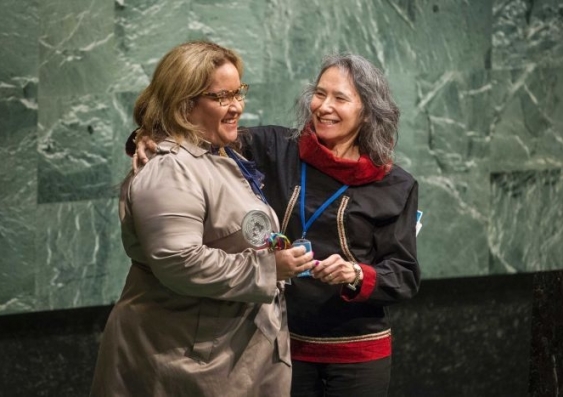UNSW academic chairs UN forum
Human rights lawyer Professor Megan Davis has been elected Chair of the United Nation's permanent forum on Indigenous issues.
Human rights lawyer Professor Megan Davis has been elected Chair of the United Nation's permanent forum on Indigenous issues.

Susi Hamilton
UNSW Media Office
9385 8920 or 0422 934 024
susi.hamilton@unsw.edu.au
UNSW human rights lawyer Professor Megan Davis has been elected Chair of the UN's permanent forum on Indigenous issues.
Professor Davis is one of Australia’s foremost experts on constitutional recognition of Indigenous peoples having served as a member on the Prime Minister’s expert panel. She was elected unopposed to the UN position this week at the opening of the forum’s fourteenth session in New York.
The honour comes as Australia continues to grapple with how to 'Close the Gap' on Indigenous disadvantage and how to formally recognise its Indigenous peoples. It also comes as the Pilbara Land Council prepares to travel to New York to ask the UN to condemn the West Australian government’s decision to close remote Aboriginal communities.
Professor Davis became the first Aboriginal Australian to be elected to a UN body in 2010 and has served as Australia’s representative on the 16-member permanent forum for the past four years. She was elected to a second term in 2014.
Davis told ABC Radio National her election as Chair was “exciting”. “It’s always a privilege to be elected by your peers to a body like this and to be the Chair,” she said.
Davis, who heads UNSW’s Indigenous Law Centre, said the election had brought her full circle in her career. She said she was thankful to her family, particularly her mother, for having instilled in her at a young age “a sense of not just education but the world around us”.
“Even though mum was on the single parent pension, she could always afford to buy TIME magazine and I think that’s where I first became, as a little girl, obsessed with the United Nations and especially the General Assembly – I even had a picture of it on my wall as I was growing up!” she said.
“It was a bit of a spin out today sitting on the podium and chairing the meeting, so I really have come full circle.”
2015 was shaping up as a particularly interesting year to be on the permanent forum, Davis said.
“Some Australian issues are quite prominent this year, one being closures of Western Australian Aboriginal communities. It goes to the heart of traditional livelihoods, land rights, the right to practice indigenous culture.
“I’ve been surprised just how much world focus there is on that. It’s had a lot of international press and virtually everyone I’ve spoken to at the forum knows about it.”
Davis has just returned from the Russian Federation where she toured the Arctic and the country’s Indigenous autonomous regions to learn about Russian Indigenous constitutional recognition.
“Most countries with Indigenous populations have some form of Indigenous Constitutional recognition… and I’m talking about strong, formal recognition not the kind of symbolic constitutional recognition that both political parties are talking about in Australia,” she said.
Davis told the ABC recognition of Australia’s Aborigines was in “difficult days”. Political will for meaningful recognition was faltering, she said.
“And I think that’s primarily because both parties really only ever envisioned a token, symbolic recognition if I’m to be honest. And when it comes to countenancing substantive or concrete measures that most comparative Commonwealth jurisdictions have taken we just shy away from it.”
Read more about Professor Davis and her views on constitutional recognition in the UNSW magazine (Uniken) cover story 'Words are not enough'.
Hear her ABC interview here.